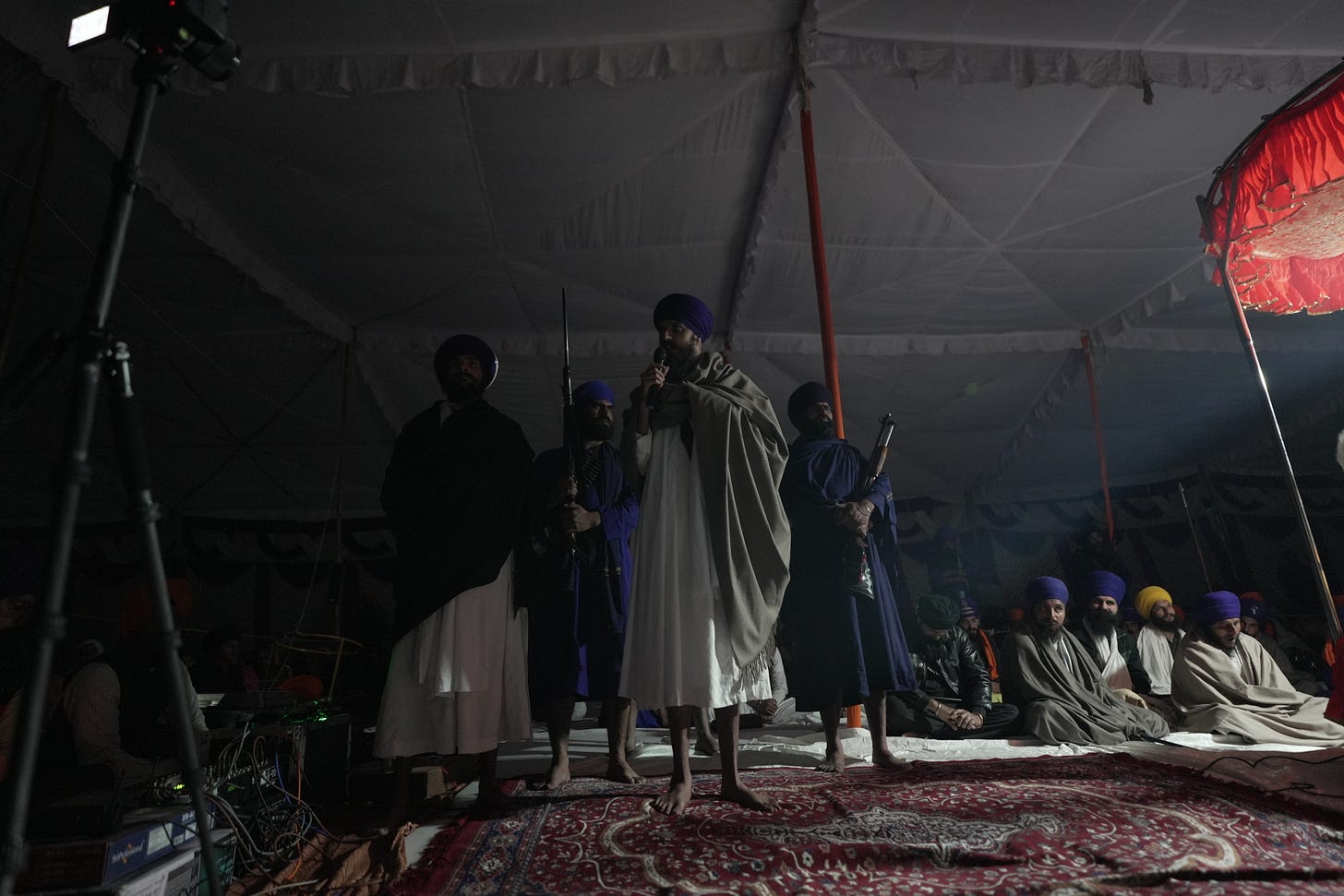Two Years Since His Imprisonment, Amritpal Singh Has Still Not Been Broken
"Periods of imprisonment are often valuable for intelligence services as a means to co-opt and moderate the positions of their captives. Still, Amritpal Singh has shown no signs of capitulation."
Karam Singh
May 1, 2025 | 2.5 min. read | Opinion
In the past two years of Amritpal Singh’s imprisonment, there have been many developments, from serious accusations of police abuse inside Dibrugarh prison to a successful parliamentary election.
The man India has relentlessly accused of being a violent extremist, going on to win a spot in the highest legislative body of India with record-breaking margins, and increasingly dominating the political conversation in Punjab, continues to shatter Anti-Sikh narratives.
Periods of imprisonment are often valuable for intelligence services as a means to co-opt and moderate the positions of their captives. Still, Amritpal Singh has shown no signs of capitulation. He has succeeded in captivating large swaths of rural Sikhs despite the continuing onslaught of tabloid-style mudslinging by the Indian and Punjabi media.
For his opponents, any hint of controversy in Amritpal Singh’s periphery is used to engage in sensationalist political theatre.
Recently, Akali Dal Badal, which Sikh voters have largely discredited, has set its sights on Amritpal Singh, who has been gaining more ground among youth dissatisfied with traditional political parties. Many establishment leaders from all walks are also feeling the pressure to answer concerns regarding the flagrant abuse of power used to extend Amritpal Singh’s arbitrary detention for another year earlier this month.
Much of these outlandish headlines target Amritpal Singh from whatever leads they can uncover, from his brother to distant relatives. All rumours are green-lit for publishing. Amongst this, even decades-old recordings or manipulatively edited clips are not off limits.
With the advent of sophisticated manipulative technologies, Indian authorities could further subvert political change in Punjab, if not across the diaspora. This issue concerns not only Punjab but the entire world of media consumption. The UN General Secretary has warned that “Left unchecked, artificial intelligence (AI) could destabilize democratic systems by spreading disinformation, fueling hate speech and distorting public opinion through deep fakes.”
Although it is difficult to ascertain the extent of media manipulation, it is known that Modi's centralization of power has deteriorated press freedoms in India. Just this year, Modi’s crackdown on foreign press led to journalists from France and Australia losing their work permits due to their critical reporting. Similarly, many suspect that covering atrocities against the Sikh community may open reporters up to the possibility of persecution from the state. India currently ranks 159/180 on the RSF’s press freedom index.
Nonetheless, Amritpal Singh's 2024 Lok Sabha victory represents many things, beyond a repudiation of the false Indian narratives about Sikhs in Punjab.
For those with a keen eye, it has meant the return of Panthic forces into electoral politics, posing a significant challenge for the Akali Dal (Badal), which has dominated the Sikh vote for over three decades.
Although there have been splinter Panthic parties over time, many have not gained widespread appeal similar to the movement of Amritpal Singh, which subsequently led to significant victories in two constituencies in 2024. Alongside Amritpal Singh, the son of Indira Gandhi's assassin, Sarabjeet Singh, was also elected MP in Faridkot.
Although fundamental questions regarding the viability of electoral politics remain, many see Amritpal Singh’s politics as a vehicle to deliver the longstanding demands of the Sikh community.
The Akali Dal has a special place in the Sikh community. Historically, it has been the single most powerful vehicle for change in modern Punjab. But it, too, requires a jolt.
Earlier this year, Amritpal Singh formed his own political party, Akali Dal Waris Panjab De, with Amritpal Singh’s father, Tarsem Singh, and newly elected MP from Fardikot, Sarabjeet Singh, at its helm.
Since its inception, Amritpal Singh’s party has drawn large crowds and engaged with Sikh voters at the grassroots level, hoping to counter increasing power centralization under Modi’s nationalist government. At its inauguration event, the party passed 15 resolutions, ranging from combatting the ongoing drug epidemic to wider Sikh autonomy and independence in Punjab.
For better or for worse, Punjab, like many places in the world, has been dominated by the politics of individual personalities. Although ideological consensus on issues such as independence would be ideal, sometimes a strong central figure is necessary to guide the community through turbulent times.
On the day of Amritpal Singh’s arrest, he said, “this is not the end but the beginning”. As more Sikhs rally around his movement, his words seem more accurate than ever.
Karam Singh is a writer and activist based in Northern California. He previously studied at UC Berkeley & San Jose State University. He currently serves as a board member for Lehar International, an umbrella organization for Sikh students and activists.
Baaz is home to opinions, analysis, and original reporting for the Sikh and Punjabi diaspora. Support us by subscribing. Find us on Twitter, Instagram, and Bluesky at @BaazNewsOrg. If you would like to submit a written piece for consideration please email us at editor@baaznews.org.



This could be a blessing in disguise: Amritpal’s sudden appearance and rise in politics looks eerily similar to Bhindrawala’s. We have seen in the past how RSS functionaries helped mobilize support for Sidhu : it’s very easy for state controlled IT cell to manage narratives via highly targeted personalized content . Amrit pal should be viewed with suspicion and caution. We do t need another Bhindrawala whose antics only gave anti Sikh forces an excuse to tarnish the image of Sikhs and used him to further their own nefarious agendas.